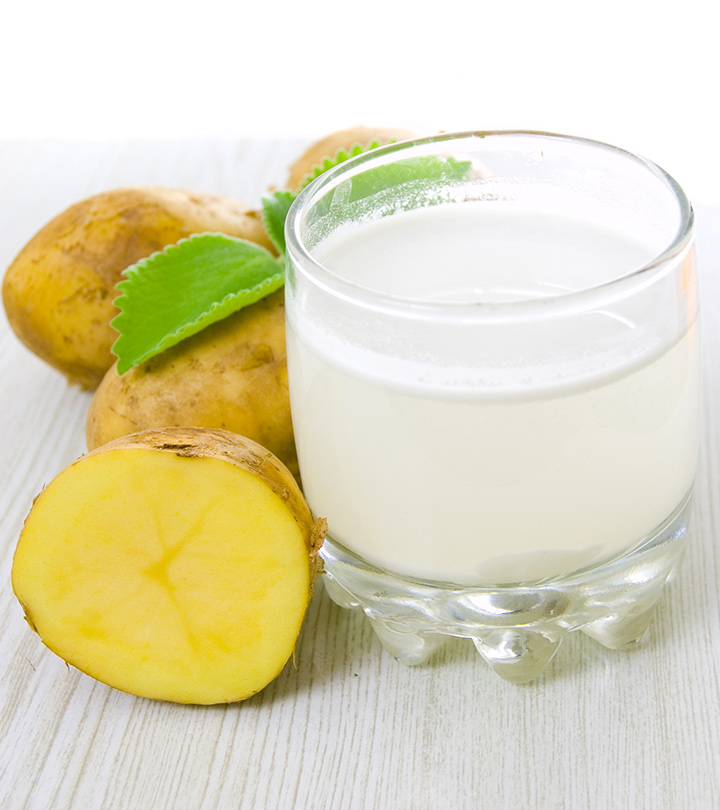If you are wondering how to use tea tree oil for psoriasis, you have come to the right place. Here, we will explain how tea tree oil can help treat this skin condition. Psoriasis is an autoimmune inflammatory skin condition triggered by a viral infection, sunburn, and stress. It can also be genetic. Tea tree oil is one of the best options available to treat psoriasis at home. It reduces inflammation. Keep scrolling to know more.
In This Article
What Is Psoriasis?
Shutterstock
Psoriasis is an immune-mediated (autoimmune) chronic inflammatory skin condition. It affects the scalp, skin, nails, and joints. It is characterized by raised, abnormal skin areas with silvery and scaly patches that could also bleed and cause pain. Common triggers of psoriasis include viral infection, stress, excess alcohol consumption, and sunburn. Psoriasis affects over7.4 million adults in the United States alone (1). This autoimmune disorder may also be genetic (2).
Fun FactSeveral well-known people like Kim Kardashian, Cara Delevingne, Kris Jenner, LeAnn Rimes, and La La Anthony, have psoriasis and use their platforms to discuss their experiences with the condition.
There are five types of psoriasis. We have discussed them in detail below.
Types Of Psoriasis
- Plaque Psoriasis: Plaque psoriasis (Psoriasis Vulgaris) is the most common form of the condition that makes up for 80 to 90 percent of the cases (3). You may notice thick red patches of skin covered with a white or silver buildup of dead skin cells or scaly layers. These scaly red patches are usually 1 to 10 centimeters wide and often appear on the scalp, lower back, knees, navel area, and elbows.
- Guttate Psoriasis: It is the second most common type of psoriasis and often starts at an early age (usually between childhood and young adulthood). It appears as small, drop-shaped lesions mostly on the arms, torso, and legs. You may often notice them on your face and scalp too. The common triggers of this type of psoriasis include certain medications like antimalarials, infections such as flu, skin injury, and stress.
- Flexural Psoriasis: It is also known as inverse psoriasis that forms red patches within the skin folds. It affects the skin folds between the thighs and groin, armpits, and under the breasts. This type of psoriasis appears as smooth, red patches.
- Pustular Psoriasis: It is a severe form of psoriasis that causes scaly, red skin patches. It may affect isolated areas of the body, like the hands and feet. The raised bumps are filled with sterile pus. This condition leads to fever, loss of appetite, muscle weakness, and chills. Some people experience cyclic periods of pustules and remission.
- Erythrodermic Psoriasis: It is also known as exfoliative psoriasis. It is a rare psoriasis type that involves widespread skin inflammation and looks like severe burns. It also can cause your skin to lose its ability to control body temperature. Emotional stress, sunburn, infection, and alcoholism lead to erythrodermic psoriasis.
Psoriatic arthritis (that attacks the joints), nail psoriasis, and scalp psoriasis are the other forms of this condition.
Would you like to know more about how to use tea tree oil for psoriasis? Continue reading!
Is Tea Tree Oil Good For Psoriasis?
Psoriasis can affect people of all age groups, men and women alike (4).
So the question now is – Is tea tree oil good for psoriasis? Derived from the leaves of the Melaleuca alternifolia plant, which is native to Australia, tea tree oil has proven medicinal benefits for treating skin disorders (5). It has been used for centuries by Australian tribes in the treatment of skin ailments and conditions. However, it is only used topically.
- This oil acts against different types of bacteria, fungi, viruses, and even protozoansi XParasites that grow and proliferate to spread parasitic diseases such as malaria, diarrhea, and leishmaniasis. and kills them efficiently. The multidirectional antimicrobial properties of tea tree oil make it a simple yet effective solution for treating psoriasis (6).
- It also possesses healing and anti-inflammatory properties that speed up the recovery of the affected area. Itching, redness, acne, and swelling are greatly reduced by using this essential oil (7).
- Tea tree oil also helps to remove the scales and the accumulated dead skin cells(6).
- The antioxidant properties of tea tree essential oil act against several fungal, bacterial, and viral infections (8).
However, more scientific studies are warranted to understand the benefits of tea tree oil for psoriasis. Tea tree oil can be used in more than one way to deal with psoriasis patches and get rid of them. Mentioned below are the multiple ways to use this potent oil.
How To Use Tea Tree Oil For Psoriasis?
Shutterstock
1. Tea Tree Oil For Psoriasis
The antimicrobial compounds in tea tree oil will get rid of the infection, which may cause the psoriasis patches to aggravate (9). Its healing properties will renew the damaged skin cells. This remedy is best used for psoriasis on the nails.
You Will Need
A few drops of tea tree oil
What You Have To Do
- Clean the affected area and pat it dry.
- Apply tea tree oil directly and massage the area gently so that the oil is
- Leave it on overnight.
How Often You Should Do This
Repeat this every night.
Caution
Tea tree oil is strong in its concentrated and pure form and may cause skin irritation. Opt for a remedy containing a diluted version of this oil if you have sensitive skin.
Related: 31 Health Benefits Of Tea Tree Oil And Its Side Effects
2. Coconut Oil, Lavender Oil, And Tea Tree Oil For Psoriasis
Shutterstock
Coconut oil is rich in medium-chain fatty acids that moisturize the dry and flaky skin at the affected site (10). It is also antimicrobial in nature because of its lauric acidi XA fatty acid often derived from coconut oil that is widely used in the cosmetic industry to treat skin inflammation. content (11). Much anecdotal evidence suggests that lavender oil soothes the irritated and itchy skin at the psoriasis patches. You can use this remedy for psoriasis on larger surface areas such as the legs, the elbows, or the back.
You Will Need
- 1 virgin coconut oil
- 5 drops lavender oil
- 10 drops tea tree oil
What You Have To Do
- Pour all the oils into a bottle and shake well.
- Use a few drops of this blend on the affected area and massage gently.
- Keep it on for 2-3 hours at least.
How Often You Should Do This
Reapply 1-2 times daily.
3. Tea Tree Oil And Almond Oil For Psoriasis
Shutterstock
To avoid the risk of skin itching and irritation, tea tree oil is diluted with a carrier oil in this method. Almond oil is very hydrating and nourishing for the skin. The dryness, itching sensation, and redness will soon be gone by using almond oil along with tea tree oil (12). This remedy is safe to use for psoriasis on the face.
You Will Need
- 2 tablespoons almond oil
- 5-6 drops tea tree oil
What You Have To Do
- Dilute the essential oil in the carrier oil and apply the oil mixture to the affected area.
- Leave it on for as long as possible, preferably overnight.
Subscribe
How Often You Should Do This
Apply this once or twice every day.
Related: 9 Amazing Health Benefits Of Almond Oil And Side Effects
4. Vinegar And Tea Tree Oil For Psoriasis
The acids present in ACV help to exfoliate the patches and reduce the thickness of the scales. Both psoriasis and eczemai XA skin condition characterized by dry, itchy, and irritated skin that can be caused by environmental factors, allergies, etc. patients can benefit from this remedy. However, there is limited scientific research to prove this claim.
You Will Need
- 1 tablespoon apple cider vinegar
- 4 tablespoons water
- 4-5 drops tea tree oil
- Cotton ball
What You Have To Do
- Mix the vinegar, essential oil, and water.
- Apply this solution to the affected area using the cotton ball.
- Let it dry for 10-15 minutes and then rinse it off.
How Often You Should Do This
Do this twice a day.
Related: 17 Surprising Ways To Use Vinegar For Your SkinStylecraze SaysAlternatively, you can dilute ACV in 1/4 cup of virgin coconut oil, jojoba oil, or grapeseed oil.
5. Aloe Vera And Tea Tree Oil For Psoriasis
Shutterstock
Aloe vera contains hydrating nutrients along with anti-inflammatory compounds. Topical application of aloe vera extract was found to reduce psoriasis lesions without any side effects (13). It was well tolerated by all patients and can be considered a safe treatment for patients dealing with psoriasis.
You Will Need
- 1 cup aloe vera gel
- 10-12 drops tea tree oil
- 10 ml jojoba oil (optional)
- 10 ml vitamin E oil (optional)
What You Have To Do
- Mix the tea tree oil and aloe gel and
- Apply some of this mixture on the psoriasis patches.
- Massage for a minute or two and leave it on.
- Rinse after half an hour.
- Store the remaining tea tree oil-infused aloe gel in an airtight container.
How Often You Should Do This
Apply this twice a day.
Related: How To Use Aloe Vera To Treat Stretch Marks?
6. Tea Tree Oil Shampoo For Psoriasis
When psoriasis is on the head, it can be even more troublesome. Tea tree oil-based shampoos work really well in treating scalp psoriasis. The shampoo will do its job of cleansing your scalp and hair, while the tea tree oil will work its antiseptici XAn antimicrobial substance applied to prevent the growth of disease-causing microbes on the skin or wounds. effect on your psoriasis.
You Will Need
- Mild shampoo
- Tea tree oil
What You Have To Do
- Add a couple of drops of tea tree oil to your regular shampoo and shake
- Rinse your hair and scalp as usual with this.
How Often You Should Do This
Use this regularly to rinse your hair.
Tea tree oil-based shampoos are also commercially available and can be used instead of infusing a regular shampoo with tea tree oil.
These are some of the effective home remedies with tea tree oil. Are you wondering how to apply this oil to your skin? Find out the answer in the next section.
Can I Apply Tea Tree Oil Directly To My Skin?
Yes, you can apply tea tree oil directly to your skin. But ensure you dilute it. A pure (100%) form of tea tree oil may irritate your skin. You can use vegetable, almond, or olive oils to dilute tea tree oil.
Are you allergic to tea tree oil? Have you been looking for alternative remedies? Go through the next section.
Other Home Remedies For Psoriasis
Few other home remedies are used to manage the symptoms of psoriasis include:
- Capsaicin: It is the active component in chili peppers responsible for the spicy flavor. You can apply creams containing capsaicin to reduce psoriasis symptoms, including skin redness and scaling (14).
- Aloe Vera: Applying any hydrophilic creami XA skin protection cream that moisturizes and soothes dry, itchy, and irritated skin by penetrating deep into the skin. containing 0.5 percent of aloe vera extract can help reduce skin redness and scaling associated with psoriasis (13).
You may also use Epsom salts to soothe irritated skin (15). Consuming foods rich in omega-3 fats may also help manage psoriasis symptoms (16).
Certain lifestyle changes also may reduce the symptoms of psoriasis-like flare-ups and itchiness. We have discussed them in the next section.
What Lifestyle Changes Can Improve Psoriasis?
You can treat psoriasis symptoms by taking simple measures at home. Take a warm water bath for 5 to 15 minutes per day without using any harsh soap. Apply a moisturizer after the bath to reduce any inflammation and psoriatic lesions. Sun exposure for a limited time also helps treat psoriatic symptoms.
There is no cure for psoriasis. However, you can get some relief from the symptoms with these remedies. But keep in mind that these remedies may not work the same way for all. Also, no natural remedy should replace medical treatment.
Medical Treatments For Psoriasis
Most people need to undergo medical treatments to control psoriasis symptoms. Topical creams and ointments, phototherapy, and some systemic and biologic medications are generally prescribed as part of medical treatment.
Corticosteroids, which are anti-inflammatory drugs, are the most commonly prescribed topical medications for psoriasis(17). These medications are subjected to direct application on the affected skin.
Exposure to natural sunlight (phototherapy) or artificial UV light for limited periods can ease psoriasis symptoms (18). However, this should be monitored by your doctor.
In most severe psoriasis cases, your doctor may prescribe systemic medications (that alter the immune system) to help reduce inflammation. You can take these drugs orally or by injection. However, these medications may have serious side effects you must be wary of. Treating moderate-to-severe cases of psoriasis may involve biologic medications(that target a specific part of the immune system) to manage symptoms (19).
Tea tree oil is considered safe for using psoriasis. However, it may cause side effects in some people. Keep reading to know more in detail.
Risks And Precautions
Undiluted tea tree oil can be quite strong and must be used with caution. Apply it with a cotton ball first to a small area of your skin. If there is no itching or burning, you can apply it to the other affected areas.
As per anecdotal evidence, those allergic to plants like cloves or eucalyptus may experience allergies to tea tree oil as well. These allergies could be either mild or serious, and they can include rashes, irritation, swelling, and a burning sensation. Never intake this oil orally. Oral intake may cause congestion, light-headedness, vomiting, drowsiness, and diarrhea. However, more research is warranted in this regard.
Pregnant or breastfeeding women, people with an autoimmune blistering disorder like linear IgA, and prepubertal boys should be cautious while using tea tree essential oil (20), (21), (22).
Use the above remedies for treating psoriasis and consult your doctor in case of any emergency.
Tea tree oil has antimicrobial and anti-inflammatory properties that may help manage psoriasis symptoms. You can either use the diluted oil directly to the affected areas or combine it with other products and use it. However, more research is needed to back up these claims. But, you may use the oil after checking with your doctor because it appears to provide effective relief. Never use tea tree oil orally, and be aware of any negative side effects. It’s important to remember that psoriasis has no cure. However, a few lifestyle changes or medical therapies may provide some relief from the symptoms.











